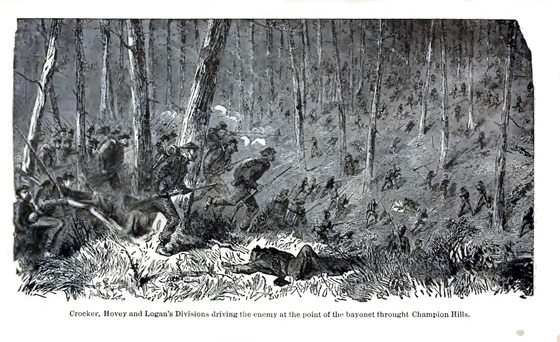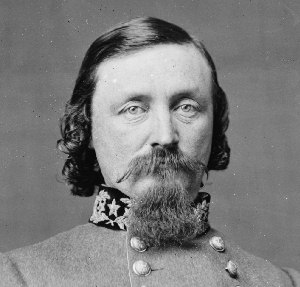MAY 16TH.—We rolled out of bed this morning early, and had our breakfast of slapjacks made of flour, salt and water, which lie on a man’s stomach like cakes of lead—for we are out of all rations but flour and salt, though we hope soon for some variety. We heard heavy firing about eleven o’clock. Our division reached Champion Hill about two P. M., and filed into a field on the right of the road. We were drawn up in a line facing the woods through which ran the road we had just left. It was by this road the rebels came out of Vicksburg to whip us. We had orders to lie down. The command was obeyed with alacrity, for bullets were already whizzing over our heads. I never hugged Dixie‘s soil as close as I have to-day. We crowded together as tight as we could, fairly plowing our faces into the ground. Occasionally a ball would pick its man in spite of precaution, and he would have to slip to the rear. Soon we got orders to rise up, and in an instant every man was on his feet. If the former order was well obeyed, the latter was equally so. The enemy charged out of the woods in front of us in a solid line, and as they were climbing the fence between us, which separated the open field from the timber, DeGolier’s battery, stationed in our front, opened on them with grape and canister, and completely annihilated men and fence, and forced the enemy to fall back. Such terrible execution by a battery I never saw. It seemed as if every shell burst just as it reached the fence, and rails and rebs flew into the air together. They, finding our center too strong, renewed their charge on our left, and succeeded in driving it a short distance, but their success was only for a moment, for our boys rallied, and with reinforcements drove them in turn. We now charged into the woods and drove them a little ways, and as we charged over the spot so lately occupied by the foe, we saw the destruction caused by our battery, the ground being covered thickly with rebel grey. When we reached the woods we were exposed to a galling fire, and were at one time nearly surrounded, but we fought there hard until our ammunition was exhausted, when we fixed bayonets and prepared to hold our ground. A fresh supply of ammunition soon came up, when we felt all was well with us again. Meanwhile the right of our line succeeded in getting around to their left, when the enemy retreated towards Vicksburg, lest they should be cut off.
The battle to-day was commenced early in the morning by McClernand’s great fighting corps, and was a hot and severe contest, until Logan‘s division approached the road on the Confederates’ left, between them and Vicksburg, when the foe wavered and began to break. This was a hard day’s fight, for the rebels, finding that they had been beaten in three battles about Vicksburg, had no doubt resolved to make a desperate stand against our conquering march; but alas! for them, this day’s course of events was like the rest. When the fight was over, Generals Grant, McClernand, Sherman, McPherson and Logan rode over the victorious field, greeted with the wildest cheers. I wonder if they love their men as we love them. We received our mail an hour or two after the fight, and the fierce struggle through which we had just passed was forgotten as we read the news from home. Our fingers fresh from the field left powder marks on the white messengers that had come to cheer us.
Our forces captured eleven pieces of artillery and over one thousand prisoners. The retreating army will make another stand, but we shall move right on, undaunted. Several amusing incidents have occurred during the battle to-day. Company A, of the 20th, was sent out to skirmish, and moved forward till they could see the enemy. By this time General Logan made his appearance, when one of the boys who wished to go into the fight without impediments, approached Logan and said, “General, shall we not unsling knapsacks?” “No,” was the stern reply, “damn them, you can whip them with your knapsacks on.” This same company, in full view of a rebel battery, had taken refuge in a deep ditch, and when afterward the rebel captain cried out, “ready, take aim,” Lt. Bryant, feeling secure in his position, interrupted the order with a shout, “shoot away and be damned to you.”
We moved up through the woods to the road again after the fight, where we halted an hour. Near the road was a farm house which was immediately taken possession of for a hospital.



 MAY 16TH.—It appears, after the consultation of the generals and the President yesterday, it was resolved not to send Pickett’s division to Mississippi, and this morning early the long column march through the city northward. Gen. Lee is now stronger than he was before the battle. Gen. Pickett himself, with his long, black ringlets, accompanied his division, his troops looking like fighting veterans, as they are. And two fine regiments of cavalry, the 2d and 59th North Carolina Regiments, passed through the city this morning likewise.
MAY 16TH.—It appears, after the consultation of the generals and the President yesterday, it was resolved not to send Pickett’s division to Mississippi, and this morning early the long column march through the city northward. Gen. Lee is now stronger than he was before the battle. Gen. Pickett himself, with his long, black ringlets, accompanied his division, his troops looking like fighting veterans, as they are. And two fine regiments of cavalry, the 2d and 59th North Carolina Regiments, passed through the city this morning likewise.

